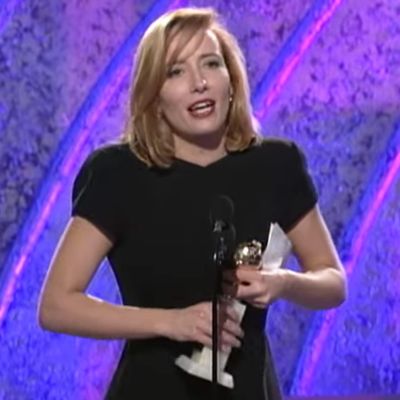
The 2021 Golden Globe Awards will be, like all awards shows that forged ahead in the past year, a virtual affair. Tina Fey and Amy Poehler will host from opposite coasts as an array of nominees and winners will either accept their trophies or clap politely from various remote locations, such as “home.” Obviously, while we’re gaining a lot from this responsible arrangement (safety!), we’re losing too: namely, the spontaneous electricity that comes from having an in-person awards show, and that goes double for the Globes, whose title in the vast awards-show landscape tends to be “the fun one” compared to its stuffy cousin, Oscar. (Yes, it also tends to be “the corrupt one.”)
Take, for example, the Globes behavior of Emma Thompson, who at various times at the ceremony has kicked off her heels to present an award, brought her cocktail onstage with her, and delivered an acceptance speech in the persona of Jane Austen. The latter happened in 1996, when the Golden Globes — presented in January of ’96 but honoring the best film and TV of ’95 — surprisingly toasted Sharon Stone’s performance in Casino over the likes of Susan Sarandon and Meryl Streep, vaulting her toward what would become her only Oscar nomination to date. (Stone’s “Okay, it’s a miracle” reaction underlines just how much of a surprise that win was.) Also winners that night: Brad Pitt (Best Supporting Actor for 12 Monkeys) and Nicole Kidman (Best Actress in a Comedy/Musical for To Die For), two huge movie stars who hadn’t yet begun to be recognized for their skills as actors. The Globes, in their typical stargazing way, ended up being the first real awards show to put Pitt and Kidman into that echelon. This was also the year that Fox’s family drama Party of Five took the Best Drama Series trophy, a typically Globes-ian decision to reward the fun new show over critically acclaimed prestige series like NYPD Blue and ER.
The night’s best entertainment value, however, came from a generally unlikely spot: the Best Screenplay category. Despite being one of the very few Golden Globe categories that doesn’t honor a performer, it managed to showcase some boldface names: Aaron Sorkin, who hadn’t yet been elevated by The West Wing, was nominated for The American President, and Tim Robbins was nominated for Dead Man Walking. Then there was Thompson, recognized for adapting Jane Austen’s Sense and Sensibility for the Ang Lee–directed film version that she also starred in. It’s pretty unusual for the star of a film to also handle the screenplay adaptation, especially if they’re not also directing, so Thompson’s contributions naturally stood out from the pack. And she won. Taking the stage with a folded-up piece of paper in her hand, the international symbol for “boring laundry list of names to thank,” Thompson seemed like she was about to deliver a standard speech. Until she didn’t.
What came out of her mouth will go down in history as one of the most creative and funny awards-show speeches, and you can hear the in-room audience brighten up when they catch on to what Thompson is doing. In her posh accent, Thompson-as-Austen recounts her night at the “Golden Spheres” with a detached amusement at the garish goings-on, peppered with delicate little digs like “the gowns were middling.” As Austen, Thompson managed to compliment the people she’d have thanked in a normal speech, including composer Patrick Doyle, “a Scot who displayed the kind of wild behavior one has come to expect of that race,” and producer Mark Kenton, “who, as I understand it, owes me a great amount of money.” (Getting paid is actually a consistent through line in Thompson’s awards speeches. She thanked producer Ismail Merchant for facilitating her payday in her Howards End Oscar speech, and when she ended up winning the Oscar as well for Sense and Sensibility, she said she has gone to pay her respects to Jane Austen’s grave “and tell her about the grosses.”)
Up until ’96, Thompson was, at least to American audiences, known as a pretty stuffy British actress. An incredibly talented and accomplished stuffy British actress, of course, but after a decade or more of Merchant Ivory films and costume dramas at the Oscars, a stereotype had formed around the corset class. Thompson had won the Oscar for 1992’s Howards End and was nominated twice the next year for The Remains of the Day as well as for the Irish political courtroom drama In the Name of the Father. All three are great films, but they don’t exactly offer a ton of laughs. Even when Thompson ended up crossing the pond to be in the Arnold Schwarzenegger male-pregnancy comedy, Junior, her effect on the audience was more profound cognitive dissonance than any kind of reimagining of Thompson’s persona. No one in the U.S. really knew about how she came up via the comedy troupe the Footlights with her university pals Stephen Fry and Hugh Laurie, or how she had always wanted to be Lily Tomlin growing up.
The kind of clever, cheeky version of Emma Thompson that revealed herself at the Globes that year is a lot more like the version of Emma Thompson we love and appreciate today. And it’s because she gave the kind of speech that’s so particular to this awards ceremony: looser and lower stakes. The Oscars have a sense of occasion that would probably preclude you from making a speech in character, and that’s too bad, since we’d all probably love to hear what Jane Austen would have thought about the Academy Awards.
More From This Series
- The 2025 Oscars Will Have Conan O’Brien, a Wicked Performance, and a Surprise
- Cheese: An Annotated History of the Oscar Class Photo
- Seth Rogen Will Always Speak His Mind at an Awards Show


